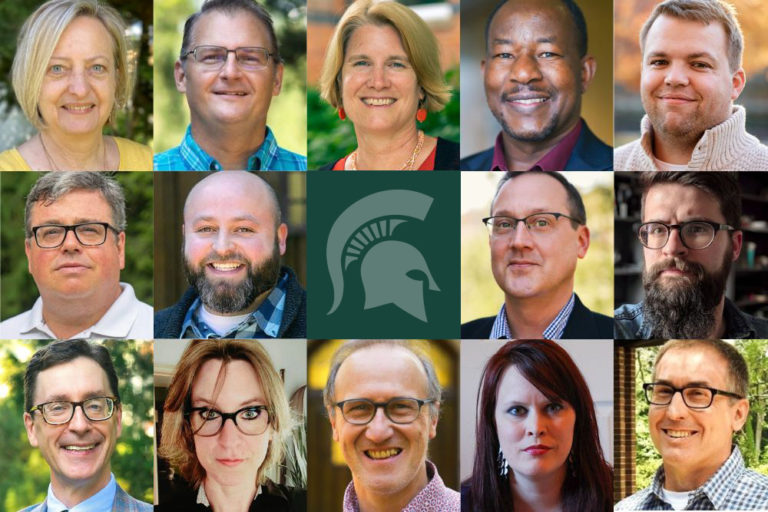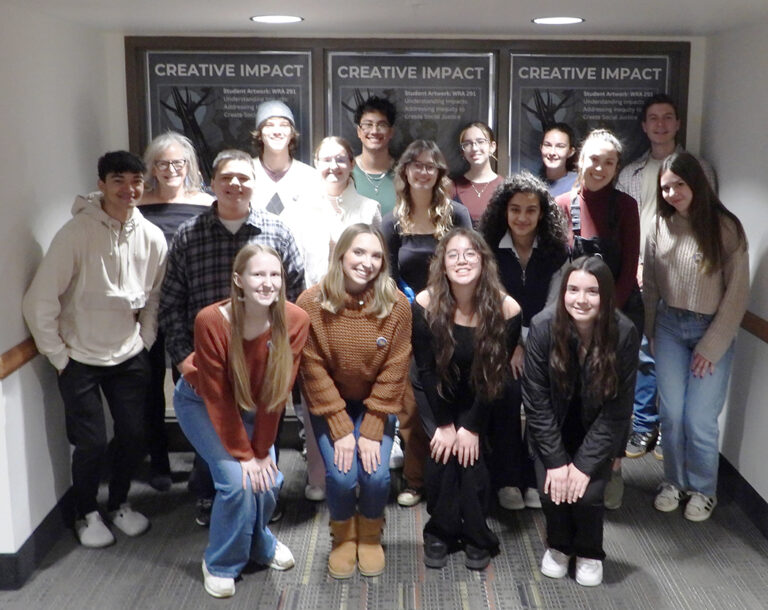
Our spotlight this week is the Writing Center @ MSU Accessibility Committee! The Accessibility Committee has been active in writing and designing for change over the past two semesters, and many of the committee’s members are also members of the WRAC community. Together with associate director Karen Moroski-Rigney, committee members Adrianna Aviles (CSLP), Emily Kayden (DRPW), Emma J. Harris (CSLP), Jacob Weiland (English), Julia Ludovici (CSLP), and Imari Cheyne Tetu (DRPW) have been actively developing resources, events, and guides to promote accessibility within and beyond the Writing Center. In the paragraphs below, members of the committee share their thoughts on their work and its relevance.
Karen Moroski-Rigney, Writing Center Associate Director and WRAC Graduate Faculty
The Writing Center’s Accessibility Committee has faced a daunting task: How do we begin the work of generating conversation and making change while working remotely during a particularly unique time in our institution’s history? Prior to the COVID-19 pandemic, our Writing Center had received the CAL Engaged Pedagogy and Programming Grant to host a speaker series on disability justice and Writing Centers. Despite the pandemic, we decided that we would still host the series virtually — and in so doing, discovered profound benefits to a digital format. The speaker series, titled Writing Centers and Access, has been made open to the public, free, has featured live American Sign Language Interpretation and live captioning (made possible by a generous donation from The Citizen Scholars Program at MSU), and has also been recorded per event so that participants can view asynchronously. Because of the series’ virtual location, we’ve averaged two hundred attendees per event! Attendees span not only the country but the globe, ranging from scholars to students to community members. Featuring scholars Dr. Jay Dolmage, Dr. Margaret Price, Dr. Julie Avril Minich, Dr. Stephanie Kerschbaum, and Dr. Christina Cedillo, the caliber of the series’ content proved compelling across disciplines and time zones—making that virtual format all the more important! Through Zoom, the events became more meaningfully accessible beyond our own campus community, and have generated field-wide conversation about the ways in which disability access is positioned in classrooms, in communities, and of course, in Writing Centers.
In addition to facilitating the speaker series, the Accessibility Committee at MSU’s Writing Center has been hard at work on a number of exciting initiatives: we’re auditing our own practices, programming, web and physical materials, hiring practices, and pedagogies to center access; we’re in the process of piloting an accessible composing revision in a section of first year writing wherein students are given resources on how to compose to better engage disabled readers in their audience; we’re developing a cache of resources we’re calling The Accessible Composing Archive (to be made public Fall 2021) with the intention of sharing those resources in our own consultations and to anyone who’d like to use them in order to facilitate the inclusion of disabled audience; we’re developing a “living” annotated bibliography of relevant disability scholarship so Writing Center professionals can locate resources in a more central place and can add resources of their own (coming Fall 2021); we’re developing both campus and community based workshops on fostering access moves and accessible composing in classrooms, in nonprofits or businesses, and beyond; we’ve received almost three dozen cross-institutional requests for workshops and resources and will spend the summer planning how to meet these requests for the next academic year; members of the committee are also presenting their research and work at conferences, have had publications accepted at major journals, and are co-editing a special issue of WLN: A Writing Center Journal centering invisible disabilities in Writing Center Work. It’s been a busy, busy year full of generative and exciting work. I’m proud of our committee and all they have accomplished!
Adrianna Aviles, Accessibility Coordinator and CSLP Graduate Student
When I first found out that I would be the accessibility coordinator this year for the writing center, I was scared. I’m the type of person who likes to have some sort of familiarity when I enter into a situation, especially in a job setting. I knew the work and the initiative the Writing Center @ MSU had taken on was important, but to be completely honest I was an ableist—I had never actually sat down and thought about accessibility or disability justice. How was I equipped to hold a position I knew nothing about? How was I equipped to help lead an initiative from which there was/is no model? After talking to Dr. Karen Moroski-Rigney, she eased some of my nerves. I knew that I would need to actively engage with this work in tangible ways. I decided to join the accessibility committee because I knew nothing about access and accessibility. The accessibility committee is learning and cultivating knowledge together. Being a part of this committee has opened my eyes to how ableism is enacted throughout every aspect of my life. Disability justice is constantly evolving and always changing, and people who want to authentically engage with this work need to extend grace towards themselves. They will need to come to grasp and confront their ableist perspectives, language, and unconscious biases. Additionally, they will need to realize that this work takes time. Accessibility work can’t be done within an academic year, but it can be started. We, the accessibility committee, work together to not only shed light on accessibility and disability justice but more importantly the constant engagement necessary to enact and embody accessibility.
Imari Cheyne Tetu, Accessibility Committee Member and DRPW Graduate Student
My involvement with the Accessibility Committee began as an offshoot of my participation in WRA 495 last fall. I signed up for the course expecting to learn useful tools for making my work more accessible. Instead, I was impressed with the urgency for critical studies of access and inclusion in higher education. It was in this class that I came to understand not only the term ableism, but my own complicity in its prevalence. Prior to taking the course and working with the accessibility committee, I knew far too little about what accessible design was and why it mattered. As a graduate student, my research interests center around user-experience design, which I’ve learned to see as a position of advocacy. To focus on questions of access seems a logical extension of this work, and one I’ve been delighted to embrace. From coordinating the Accessibility Speaker Series to developing guides on accessible design, our work is both timely and crucial. Every day, our committee is working to share both theoretical knowledge of why access matters and practical knowledge for how to write and design more accessibly. I am excited to see what we have learned over the past several months already changing the way each of us writes, designs, and participates every day. Our work and our studies have made me more aware of my decisions and my implicit biases, and I hope they do the same for others. The changes I see happening are inspiring, and I look forward to continuing this important work.
Emma J. Harris, Accessibility Committee Member and CSLP Graduate Student
I’ve been a part of our Accessibility Committee team as we’ve studied Writing Centers and Access in WRA 495, made accessible composing guides, collected resources, submitted articles, introduced the incredible scholars presenting with our Speaker Series, incorporated critical reflections on accessibility and disability into our consulting practices and materials, and co-designed (with Dr. Karen Moroski-Rigney) an accessibility session for our Strategies for Teaching Across Fields workshop in the Spring. I am incredibly excited to continue this work alongside caring colleagues and partners within MSU and beyond who are passionate about the work of increasing access within our institutions and communities. Learning from and with these folks has helped me consider accessibility and disability as essential components to everything I do. The collective efforts toward improving accessibility in our classrooms, campus resources, and communities that we are already experiencing make me hopeful, because we can do much more together, through an understanding of our shared stakes in this work. My goal, and I believe one of the key goals of the Accessibility Committee moving forward, is to pursue every avenue we can to make the spaces we interact in and communities we’re connected to radically accessible to as many folks as possible, including people we haven’t interacted with yet because these spaces or communities have been inaccessible.
Emily Kayden, Accessibility Committee Member and DRPW Graduate Student
I’m part of the accessible composing archive and programming tasks. We produce both inward and outward facing documents to help others create accessible learning materials (PDFs, Presentations, Word Docs, etc.). The programming group is responsible for reviewing our current WC practices, policies, and procedures to ensure that we are making our WC an accessible space. We also are in the process of creating an annotated bibliography to house information about accessible practices to help other Writing Centers and organizations work towards becoming accessible. My involvement in this work represents a continuation of my family’s advocacy in the fields of disability and accessibility. In a way, this is the type of work I feel particularly drawn to, if not the work I feel destined to do, and this opportunity is one that I am extremely grateful for. These projects are designed to not only emphasize the importance of this work but to also demonstrate that there are critical, concrete steps organizations can take to make their practices accessible.


